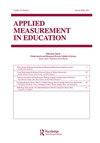Applying Cognitive Theory to the Human Essay Rating Process
IF 1.1
4区 教育学
Q3 EDUCATION & EDUCATIONAL RESEARCH
引用次数: 2
Abstract
ABSTRACT To score an essay response, raters draw on previously trained skills and knowledge about the underlying rubric and score criterion. Cognitive processes such as remembering, forgetting, and skill decay likely influence rater performance. To investigate how forgetting influences scoring, we evaluated raters’ scoring accuracy on TOEFL and GRE essays. We used binomial linear mixed effect models to evaluate how the effect of various predictors such as time spent scoring each response and days between scoring sessions relate to scoring accuracy. Results suggest that for both nonoperational (i.e., calibration samples completed prior to a scoring session) and operational scoring (i.e., validity samples interspersed among actual student responses), the number of days in a scoring gap negatively affects performance. The findings, as well as other results from the models are discussed in the context of cognitive influences on knowledge and skill retention.认知理论在人类论文评分过程中的应用
为了给作文打分,评分者利用以前训练过的技能和知识,了解潜在的标题和评分标准。记忆、遗忘和技能衰退等认知过程可能会影响评分者的表现。为了研究遗忘如何影响评分,我们评估了评分者在托福和GRE作文中的评分准确性。我们使用二项线性混合效应模型来评估各种预测因素的影响,如为每个回答评分所花费的时间和评分间隔的天数与评分准确性的关系。结果表明,对于非操作性评分(即在评分之前完成的校准样本)和操作性评分(即在实际学生回答中散布的效度样本),评分间隔的天数对成绩产生负面影响。这些发现以及模型的其他结果在认知对知识和技能保留的影响的背景下进行了讨论。
本文章由计算机程序翻译,如有差异,请以英文原文为准。
求助全文
约1分钟内获得全文
求助全文
来源期刊

Applied Measurement in Education
Multiple-
CiteScore
2.50
自引率
13.30%
发文量
14
期刊介绍:
Because interaction between the domains of research and application is critical to the evaluation and improvement of new educational measurement practices, Applied Measurement in Education" prime objective is to improve communication between academicians and practitioners. To help bridge the gap between theory and practice, articles in this journal describe original research studies, innovative strategies for solving educational measurement problems, and integrative reviews of current approaches to contemporary measurement issues. Peer Review Policy: All review papers in this journal have undergone editorial screening and peer review.
 求助内容:
求助内容: 应助结果提醒方式:
应助结果提醒方式:


